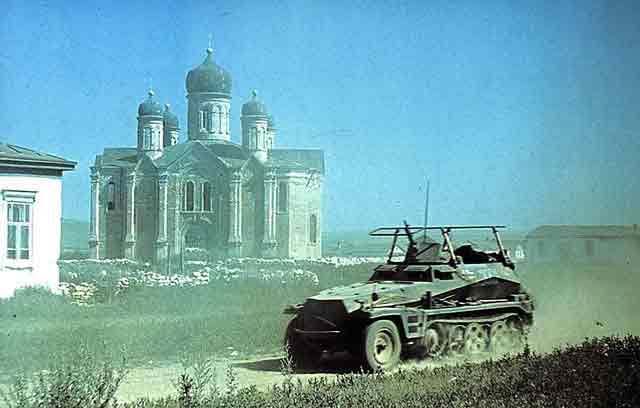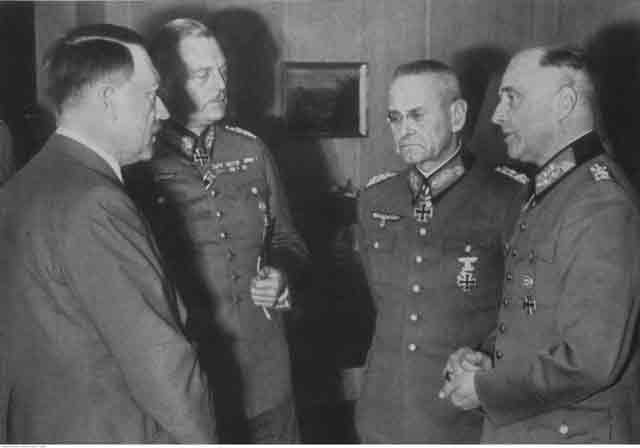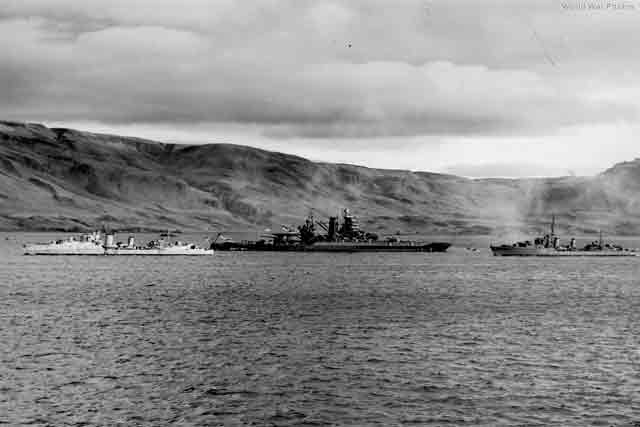Monday 13 January 1941
 |
| Charles Church, Plymouth after the blitz of 1941 (derektait, Flickr). |
Italian/Greek Campaign: The Greek government announces the victory at Klisura Pass on
13 January 1941 around noontime. It becomes a day of national celebration, with Premier Metaxas and King George appearing on a balcony together.
The Greeks continue to press forward through the snow and howling winds. The Tuscano division is retreating in disarray, with one of these battalions surrounded and on or about this date surrendering. The gateway appears open to the key port of Valona, and taking it would go a long way toward ending the war and completing the conquest of Albania - if the Italians can't find a way to bar the Greek advance.
While in public everything appears to be going wonderfully for the Greeks, behind the scenes there are growing worries in England and Athens. The Germans are known to be massing in Romania, and they easily could slip through Bulgaria to invade Greece from the northeast. General Papagos, the Greek Commander-in-chief, informs British Middle East Commander General Archibald Wavell that Greece would need substantial reinforcements to deter the Wehrmacht. The British Chiefs of Staff already have made the decision to send troops to Greece, but Wavell does not have nine divisions in his entire theater of operations.
The Italians, of course, are in worse shape than the Greeks at the moment. Mussolini arrives in Albania for talks with the prime minister there. He has Chief of the Defense Staff Ugo Cavallero take over from General Ubaldo Soddu, who is relieved of command in Albania and thus has more time for his real passion, composing soundtracks to movies.
As for the Germans, they indeed are assembling a striking force in Romania. Where and when it will be used is in doubt. Speculation worldwide is that Hitler will invade Bulgaria, and then funnel the Wehrmacht across its border to Greece in order to bail out Mussolini. Hitler, however, does not want to invade Bulgaria, which the Soviet Union clearly and unequivocally has warned him is part of its "security zone." Thus, Hitler is exerting pressure on King Boris of Bulgaria to sign the Tripartite Pact. German troops already are infiltrating into Bulgaria, clad in civilian clothes, to prepare for the attack on Greece.
 |
| Newsweek, 13 January 1941: "London Scene: Fire Bomb Grows as a War Menace." |
European Air Operations: RAF Bomber Command targets Lorient, home of the U-boat fleet, during the night. It also sends Wellingtons of RAF No. 57 Squadron to bomb Ostend, Belgium and Boulogne, France.
A Halifax bomber carrying out flight tests experiences engine failure and crashes near Baldersby St. James, killing all six onboard.
The Luftwaffe returns to Plymouth again, and this follow-up raid causes more problems than the initial ones did. About 50 bombers drop incendiaries during the night, killing 26 people and injuring 117. Two men, Cyril Lidstone and George Wright are awarded George Medals for extinguishing an oil fire. Because the gas works at Coxside are hit, Plymouth is without gas for three weeks - which is a major issue in the middle of winter. An electrical plant at Prince Rock also is hit, stopping electricity for a day.
 |
| Picnicking at the beach, January 1941. Sarasota, Florida. Medium format negative by Marion Post Wolcott. |
Battle of the Atlantic: It is a quiet day at sea. The Luftwaffe attack on Plymouth damages 507-ton British freighter Wooler at Victoria's Wharf. The freighter is then towed to Southampton for repairs.
Convoy FS 387 departs from Methil.
Royal Navy corvette HMS Petunia is commissioned.
U-597 is laid down.
Destroyers USS Laffey and Woolworth are laid down.
Battle of the Mediterranean: The perimeter at Tobruk is quiet, with the Australian 6th Infantry Division methodically preparing for its next assault on an Italian fortress, and the British 7th Armoured Division repairing its tanks and getting is supplies in order. General Wavell takes this lull to fly to Athens, where he pays a courtesy call on King George II and Prime Minister General John Metaxas. They do not discuss business today, but will tomorrow.
In Malta, there are two air raid alerts. One of them involves Junkers Ju 88s which apparently are on a get-acquainted flight, as they fly over the island in perfect formation but do not attack. This is an omen of things to come, as Fliegerkorps X based at Catania, Sicily now has more than just Stukas with which to attack.
Royal Navy light cruisers HMS Orion and HMAS Perth take on passengers deposited there during the Excess Convoy. They then depart with them for Malta.
Soviet Military: Ivan Konev becomes Commander-in-chief of the North Caucasus Military District, while Andrey Yeryomenko (Eremenko) takes over as commander of the prestigious 1st Red Banner Far Eastern Army based in eastern Siberia.
 |
| Jesse Jones on the cover of Time Magazine, 13 January 1941. Jones has been head of the Reconstruction Finance Corporation and also currently is the US Secretary of Commerce. Much of mid-century Houston's skyline was a result of Jones. |
US Military: The federal government inducts seven Nation Guard units from Iowa, Louisiana, New York, Pennsylvania, and South Carolina into the US Army.
German Government: Adolf Hitler begins another round of diplomatic events. These will take place from 13-20 January 1941 and include visits from Mussolini, General Antonescu of Romania, and others. The first to visit is King Boris III of Bulgaria. Hitler asks the king to join the Tripartite Pact and permit passage of German troops through Bulgarian territory into Greece. Hitler's overarching objective, however, is to get Bulgaria to declare war on Great Britain. King Boris demurs and makes no promises at this time.
US Government: The US government extends US citizenship by birth to all residents born in Puerto Rico.
French Indochina: The French begin preparing a naval action against the invading Thai forces.
China: The attacks continue by the Nationalist Chinese 3rd War Area against the encircled portions of the Chinese Communist New 4th Army near Maolin on the Yangtze River.
Swiss Homefront: James Augustine Aloysius Joyce, one of the truly towering avant-garde writers, creator of the literary stream of consciousness technique and author of classics such as "A Portrait of the Artist as a Young Many," "Ulysses," and "Finnegan's Wake," passes away in Zurich, aged 58. The cause of death is a perforated ulcer. Joyce had moved there in 1940 to avoid the German occupation of France, but had lived on-and-off in Zurich (and other continental cities) since 1915. James Joyce is buried at Fluntern Cemetery near Zurich Zoo.
 |
| Life Magazine, 13 January 1941. |
American Homefront: The behind-the-scenes battles between William Randolph Hearst and RKO Studios over Orson Welles' "Citizen Kane," nearing its premiere, continue. Today, the Hollywood Reporter has a front-page story describing how the Hearst chain of newspapers is applying pressure on all of Hollywood - and not just RKO - to get RKO Pictures studio head George J. Schaefer to quash the film. The strategy, the Hollywood Reporter states, will be for the Hearst newspapers to run a series of pieces decrying Hollywood's practice of hiring immigrants and refugees to do jobs that could be filled by Americans.
Many of these immigrants, of course, are world-famous specialists such as Marlene Dietrich who are busy becoming US citizens as quickly as they can (she already has, as has Albert Einstein). A goodly proportion also is Jewish and fled Europe due to fear of Hitlerism. Einstein fled Europe when he learned that his home had been confiscated for use as a Hitler Youth camp. For them to return now would be tantamount to a death sentence.
Hearst gossip columnist Louella Parsons, still smarting from being scooped by former protégé Hedda Hopper, indeed has been calling the studios and making these threats. The other studio bosses - including Louis B. Mayer and Nicholas Schrenck, the boss at Metro-Goldwyn-Mayer's parent company - are considering how to respond in some kind of unified fashion.
Separately, the US Supreme Court decides
Sibbach v. Wilson & Co., 312 U.S. 1 (1941). This is a civil procedure decision regarding the proper jurisdiction of state versus federal laws in diversity jurisdiction cases.
In this case, which involves a car accident in Indiana, the appellant had appealed lower court rulings that held she was required to submit to a physical examination pursuant to FRCP 35(a). The court has diversity jurisdiction, meaning, the case is in federal court because the appellant and respondent reside in different states.
Appellant's argument is that Indiana state law does not require her to undergo a physical examination and that state law controls on such a substantive issue rather than federal law. Thus, the appellant claims she should not be required to undergo the exam. The respondent wants the uniform federal civil procedure rules applied in every federal court case regardless of how the plaintiff originally obtained federal jurisdiction.
The Court holds that in diversity proceedings, the determining factor as to whether to apply uniform federal rules or state laws is whether the rule in question is substantive in nature, or merely procedural. Procedural rules are those that simply address the manner or means through which substantive law may be adjudicated. Substantive rules to be applied are those of the state in which the court is based, while procedural rules to be applied are those contained in the uniform federal statutes.
In this particular case, the Supreme Court holds that state law controls the issue of a physical examination because that involves a substantive matter and not just how the case should be tried. Thus, the appellant does not have to submit to the physical examination because Indiana law does not require one.
Finally, the Modernaires vocal group joins the Glenn Miller Orchestra on a permanent basis today.
 |
| Lou Salica and Tommy Forte in their bantamweight title fight held in Philadelphia Arena, 13 January 1941. Salica successfully defended his title in a close and controversial decision. |
January 1941
January 1, 1941: Muselier ArrestedJanuary 2, 1941: Camp CategoriesJanuary 3, 1941: Liberty ShipsJanuary 4, 1941: Aussies Take BardiaJanuary 5, 1941: Amy Johnson PerishesJanuary 6, 1941: Four FreedomsJanuary 7, 1941: Pearl Harbor PlansJanuary 8, 1941: Billions For DefenseJanuary 9, 1941: LancastersJanuary 10, 1941: Malta Convoy DevastationJanuary 11, 1941: Murzuk RaidJanuary 12, 1941: Operation RhubarbJanuary 13, 1941: Plymouth BlitzedJanuary 14, 1941: V for VictoryJanuary 15, 1941: Haile Selassie ReturnsJanuary 16, 1941: Illustrious BlitzJanuary 17, 1941: Koh Chang BattleJanuary 18, 1941: Luftwaffe Pounds MaltaJanuary 19, 1941: East African Campaign BeginsJanuary 20, 1941: Roosevelt 3rd TermJanuary 21, 1941: Attack on TobrukJanuary 22, 1941: Tobruk FallsJanuary 23, 1941: Pogrom in BucharestJanuary 24, 1941: Tank Battle in LibyaJanuary 25, 1941: Panjiayu TragedyJanuary 26, 1941: Churchill Working HardJanuary 27, 1941: Grew's WarningJanuary 28, 1941: Ho Chi Minh ReturnsJanuary 29, 1941: US Military Parley With Great BritainJanuary 30, 1941: Derna TakenJanuary 31, 1941: LRDG Battered2020
























